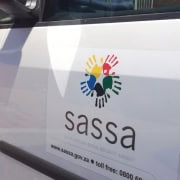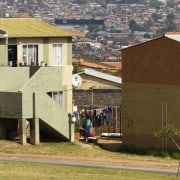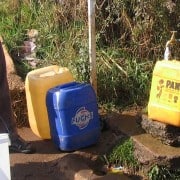|
Getting your Trinity Audio player ready...
|
28 August 2020
Issued on behalf of C19 People’s Coalition: Cash Transfers subgroup. The #PayTheGrants campaign is an initiative of the C19 People’s Coalition.
Almost five months have passed since the announcement of the lockdown. While South Africans apprehensively welcome level two, many have experienced increased hunger and desperation during this prolonged period. The staggered reopening of the economy will not result in a complete job recovery. Notably, even long before the lockdown, South Africa has faced an unemployment crisis. Social relief has fallen short of initial promises, resulting in widespread frustration.
According to the NIDS-CRAM survey, 3-million fewer people were employed in April compared to February, with job losses being concentrated among those already disadvantaged. Furthermore, the survey found that one in three income earners in February did not earn an income in April. Job and income losses are important to analyse, given that pre-lockdown, three quarters of grant receiving households relied on income other than grants. Despite top-ups of existing grants, the NIDS-CRAM survey alluded to a more than double increase in food insecurity in April, before the roll-out of the R350 Covid relief of distress (SRD) grant.
At the beginning of August, 4.4-million people had received the SRD grants, although 8- to 15-million people are estimated to be eligible. In August, the South African Social Security Agency (Sassa) acknowledged that over 8-million applications had been received, showing that the need for assistance is almost double what has been rolled out thus far. It is also unclear whether the 4.4 million people have been paid for all months in which they qualify, or if this merely represents a headcount. While some improvements have been made, we need to recognise that relief measures have been extremely slow and full of challenges, translating into widespread hunger for months on end. For example, the NIDS-CRAM survey showed that a fifth of people reported that someone in their household went hungry in the last seven days when interviewed between May and June. There needs to be greater transparency from Sassa in reporting numbers of people who applied, how many of these have been approved, and how consistent payment has been across months.
The #PayTheGrants campaign forms part of the C19 People’s Coalition under the Cash Transfers Working Group. The campaign is about holding the state accountable for its failure to implement the SRD grant by building a record of people’s experiences trying to access the grant and raising awareness to mobilise for a basic income guarantee for all.
Here is an example of one of the many stories collected: “I’ve read a few posts on this group about the 350 grants. I have a small soup kitchen where I live in an informal settlement area which is funded from my own pocket and wherever I can get supplies from. Since this SRD grant was announced I registered myself and people in the community who are unemployed, and it totalled more than 60 people. Only about 13 got approved of which about 9 received payment. I then replied to the declined ones, and everyone approved and only 4 received and the rest are all still waiting. Point of the matter is, people in poor communities who need the money after so many has been left unemployed due to the lockdown has to wait for months just to get a R350. The money can be used to buy food or simply just to make a CV to find a job. Reason why I started helping people with applying is to be self-sustainable and not depend on feeding schemes. Even today I’m still helping people apply for this Grant and this just goes to show how desperate people are to get something which they even not sure they will get. No reason was given for those applications that was declined.”
Many others had been paid for one month, but not the following months; some who applied as early as April have not heard back or seen any of the money despite qualifying.
For the first time in South African history, unemployed people between 18 and 59 years old are eligible for state assistance under the social grant system. Given the persistently high levels of unemployment even without lockdown regulations, we recognise the need for a permanent form of income guarantee for all and believe that the SRD grant has affirmed that a basic income guarantee is within the state’s reach. We further assert that social assistance extends beyond children, the elderly and people living with disabilities, and that the myth of a ‘deserving poor’ needs to be dispelled.
The Working Class Day of Action on 1 August further echoed the exasperation experienced by the majority of South Africans in relation to the dismal state assistance during the lockdown period. The Working Class Day of Action spanned both rural and urban rural areas, and included farmworkers, healthcare workers, casual workers, the unemployed, activists against gender-based based violence, shack dwellers as well as housing and human rights movements. Although the individuals and organisations encompass a broad and diverse spectrum, it highlights how large sectors of the population have been forced into even more difficult situations due to the failures of government to meet their basic needs.
Executive Mukwevho, from the EPWP Gauteng Workers Forum, said the following on the steps of the Gauteng Legislature: “The government asked us to adhere to lock down regulations and stay at home. They said they would give us R350 grants and food parcels, so we stayed at home. But two weeks later, none of this happened and we were left hungry.” This is not a unique experience, but rather an unfortunate pattern which resonates with millions of other people locked of state support during the most dire period in South Africa’s democratic history.
While efforts and talks to introduce a basic income grant should be welcomed, we are aware that these discussions have often surfaced without any desire to put into action necessary implementations. We reassert the need for a basic income guarantee, as a fundamental aspect of a redistributive framework. A basic income guarantee is distinct from a basic income grant as it emphasises the basic right of a dignified life everyone is entitled to, as opposed to a term which is associated with charity and dependency. We also highlight that a basic income guarantee is not a silver bullet which will fully address our problems, but it is rather one of the many tools needed to reduce poverty and inequality.
To echo a recent article, there can be no recovery without meaningful redistribution. Towards the national day of action for Basic Income Guarantees on 24 September we encourage participation, support and organising across communities. Please get in touch with us if you would like to be involved in mobilising work towards this historic demand.
You can join our Facebook page PayTheGrants South Africa, follow us on Twitter @PayTheGrants, share your story on Whatsapp 065 282 1793. or e-mail us at paythegrants@gmail.com.








